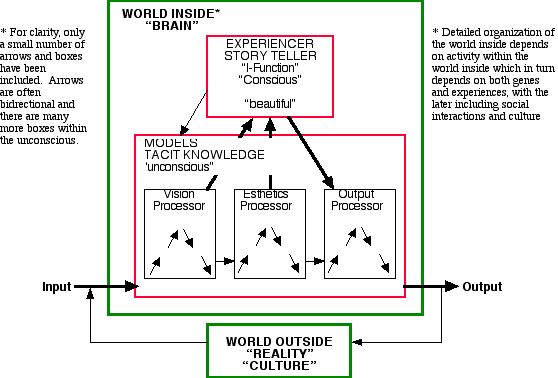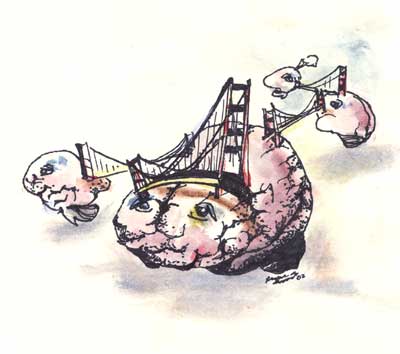Science In Society in the 21st Century: Interdisciplinarity and Beyond
A talk at
a CET sponsored workshop at Juniata College in Huntington, Pennsylvania
Implications of the NIH Roadmap for Undergraduate Life Sciences Education:
A Research Scientist Springboard Program
9-10 August 2004
http://serendipstudio.org/local/scisoc/juniata04/
| Abstract. As we begin the 21st century, the nature of scientific research is continuing to evolve, requiring concomitant changes in the education of those who will go on to careers as professional scientists. Research increasingly depends on effective collaborations among professionals with differing disciplinary perspectives, and so on having a cadre of professionals who appreciate the value of working across disciplinary borders and have the communication and synthesis skills needed to do so. While considering new educational initiatives in this context, it is worth thinking as well about some broader problems and opportunities, having to do with the nature of science itself and the role it can and should play in human culture. The need for improved communication and synthesis extends beyond the community of professional scientists. Initiatives for change in the education of professional scientists could readily be broadened in ways that would help to better engage students, irrespective of future career choices, with a strengthened scientific enterprise, one better able to fulfill for all humans the mission of being a key component of inquiry into the nature of humanity and its relation to the universe. To encourage movement in this direction, some general principles will be outlined, and some sample initiatives described.
|
CHALLENGES (OPPORTUNITIES):
Consensus (?) within the "science community"
- "growing complexity of biomedical research" (NIH Roadmap, Bio 2010)
- "declining numbers of students entering graduate schools" (NSF Science and Engineering Indicators 2004)
- "bringing together the minds, tools, data and methods of inquiry for the advancement of learning and knowledge" (National Institute for Technology and Liberal Education)
Some additionally relevant issues: science in society
- "What Sinclair Lewis admiringly described 80 years ago as "the cold, clear light" of medical science - a single-minded impartial commitment to truth and human welfare transcending all external influence - is becoming hard to find. Instead, we often see only a refracted spectrum of partisan interests that can be impossible to reassemble into truth" ... Abigal Zucker, "How Tightly Do Ties Between Doctor and Drug Company Bind?", NY Times, 27 July 2004
- "The low point for physics came in 1993 when Congress canceled the Superconducting Supercollider ... it succombed to a combination of cost overruns and skepticism about Big Science projects" ... Dennis Overbye, "After Triumph and Disillusionment, Wonder Re-enters the Story, NY Times, 27 July 2004
- "Does Science Matter?: Last month, a Harris poll found that the percentage of Americans who saw scientists as having "very great prestige" had declined nine percentage points in the last quarter-century, down to 57 from 66 percent ... such apathy may foster an age in which scientific elites ignore the public weal and global imperatives for their own narrow interests" ... William J. Broad and James Glanz, NY Times, 11 November 2003
Education: signs and seeds of the deeper problem?
- My personal view of science for many years was, well, summed up with one word, "Yuck!"; in primary school it was undistinguishable from the morass of general information we learned from uninspiring textbooks and well-meaning, but insipid teachers. Middle school was worse: sterile classrooms in which science was lectured at us, and labs were limited to teacher demonstrations with very little student-centered learning. Then came the nighmarish annual science project ... Along with college pretty much came the exit of science from my life ... Karen Cohen (high school teacher)
- "Science came from a textbook with very little experimentation or discovery because all of the answers were written on paper, you just needed to read and understand them. ... There are teacher preparation programs that continue to steer clear of the subject unless you have declared science to be your area of certification. So we know where that leaves the K-8 educator. This in turn becomes apparent in some classroms where we continue to breed a group of young people who are phobic about science" ... Janet Middleton (middle school teacher)
- "Science has always been regarded as a very different approach to life. In fact I used to think that it was a way of life for some weird people. Actually people see scientists as nerds in the society" ... Ayatola Oronti (high school teacher)
- "Oh, if we became scientists with sentiment and excitement [in] fantasy as well as [in] "truth" what a world, what a universe!" ... Maxine Tumaine (middle school teacher)
Moving Toward a Solution?
- "Moving on, the prof asked a question in class. It was after our conclusion that doctors and scientists don't really KNOW anything. That there are no 'truths' and that everything is sort of dependent on other factors. He followed this conclusion with a question: how does that make us feel? I didn't answer in class, but I'd like to here. I really think that I feel good about knowing that. If I believed everything I was told by a scientist or a group of doctors, and acted on whatever it was that they concluded, then my life really wouldn't be my own. I would be controlled by this outside authority" ... Maggie Tucker (college intro bio student)
- "We just discussed in class whether a conclusion can ever be true, definitive. Realizing that the answer is 'no' opens a whole new door to science which some students unfortunately will never be able to walk through. Science can be as analytically inviting as any novel or poem I will read in an English class because it involves opinions, guesses, and presumptions which can never really be confirmed or denied" ... Enor Wagner (college intro bio student english major)
- "Prof. Grobstein, in response to your thoughts on the New York Times article ("Does Science Matter?, Broad and Glantz, 11 Nov 2003:
"The distinctive role that science has played in our culture... is to be the embodiment of permanent skepticism, of a persistant doubt about the validity of any given set of understandings reached by whatever means (including those of science itself). It is the insistence on doubting existing understandings, not the wish to eliminate human ills nor to find 'answers' that has always animated science and has always been source of its power and successes"
This is a stirring appraisal of science and one that I would very much like to believe. But I'm beginning to have my doubts. In my conversations with others about the natural sciences and the social sciences, I have represented the views that you express in class - about the noble skepticism of science - as those of the scientific community at large. Now I sense my own naivete in having done so. The tale that Broad and Glanz weave is a misguided one, so you say, but my question is this: you and what army? Are all scientists as given to reflection about what it is they are trying to achieve? Would every scientist agree that it is Broad and Glanz who are misguided? I feel there is a strong dichotomy between the doers and the thinkers, and it is the thinking minority that allows science to remain, in large part, unaccountable for what it has brought about" ... Su-Lyn Poon (college intro bio student, anthropology major)
SOME DETAILS, in a particular context
"a recursive and unending process"
 "Science" is a useful, always changing story
"Science" is not, cannot be, does not need to pretend to be, should not pretend to be "Truth"
It is not only the "story" but the methods of developing the story that are, should be continually subject to skepticism
The success (and survival) of "science", like all human institutions, depends in the long run on its usefulness in human culture at large.
What is unique about science is not its engagement with the solution to immediate human problems but rather its commitment to "a recursive and unending process" of skeptical inquiry".
"Science" has has generated/will continue to generate by-products relevant to immediate human problems (both useful and problematic). Its long term significance (and survival) relates to its distinctive commitment.
"Science" is a useful, always changing story
"Science" is not, cannot be, does not need to pretend to be, should not pretend to be "Truth"
It is not only the "story" but the methods of developing the story that are, should be continually subject to skepticism
The success (and survival) of "science", like all human institutions, depends in the long run on its usefulness in human culture at large.
What is unique about science is not its engagement with the solution to immediate human problems but rather its commitment to "a recursive and unending process" of skeptical inquiry".
"Science" has has generated/will continue to generate by-products relevant to immediate human problems (both useful and problematic). Its long term significance (and survival) relates to its distinctive commitment.
"is of interest and is accessible to everyone,
and is an essential tool in the repertoire of anyone who
is themself trying to make sense of who they are
and how they relate to the world around them"

- The capacity to be a "scientist" is inherent in all human beings.
- It is useful to all human beings.
- It should be nurtured/encouraged in all human beings.
- For the health of both "science" and humanity.
"is a social process,
one in which the observations and tentative summaries are shared among individuals,
so that each can benefit from the ongoing inquiries of others"

- Both for its own health and for the the success of its role in human culture, "science" should both engage and reflect the widest possible diversity of human beings.
- The challenge/opportunity is not only one for students but one for ourselves as well
SOME SPECIFICS, FROM THE GENERAL TO THE LOCAL
This meeting
"It is now recognized that new organizational models for team science that place a greater value on the ability to work across traditional disciplines, involve multiple institutions and create effective communication among team members will be required"
"to discuss and begin to address the implications of the NIH Roadmap on the design and implementation of the undergraduate curriculum as it relates to students with career aspirations in biomedical research"
"this particular challenge is one for which the National Institute for Technology and Liberal Education (NITLE) model of 'bringing together the minds, tools, data and methods of inquiry for the advancement of learning and knowledge' among smaller liberal arts colleges is particularly well suited to address"
Is all consistent with, propitious for the still more ambitious task of reconceiving "science" as "everybody getting it less wrong together". So, as we work on the specific task at hand (cooperation in "the design and implementation of the undergraduate curriculum as it relates to students with career aspirations in biomedical research") let's keep in mind the broader task as well ...
- help those students develop skills of communication/cooperation not only with each other but with those outside the community of "professional scientists" as well
- help all students become more effectively engaged with the kind of skeptical, ongoing inquiry that "science" exemplifies
- help everyone (students, others, ourselves) to "be encouraged to make changes in the way they approach the scientific enterprise" ... now and in the future.
Some more examples:
Home
| Calendar | About
| Getting Involved
| Groups | Initiatives | Bryn Mawr Home | Serendip Home
Director: Liz McCormack -
emccorma@brynmawr.edu
| Faculty Steering Committee
| Secretary: Lisa Kolonay
© 1994-
, by Center for Science in Society, Bryn Mawr College and Serendip
Last Modified:
Wednesday, 02-May-2018 11:57:04 CDT


